UK deportations 2020: how BA, Easyjet and other airlines collaborate with the border regime
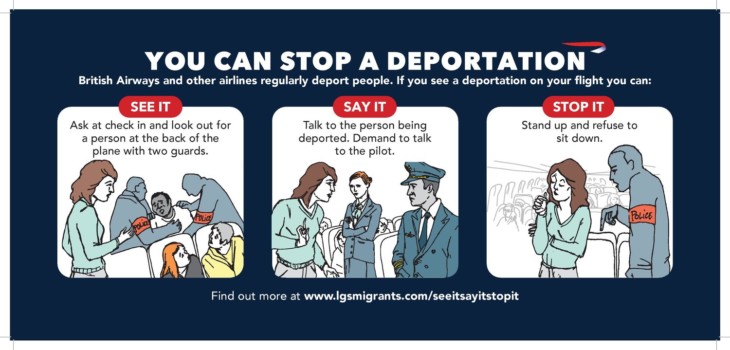
On 30 April, with UK airports largely deserted during the Covid-19 lockdown, a Titan Airways charter plane took off from Stansted airport deporting 35 people to Poland. This was just a few days after reports of charter flights in the other direction, as UK farmers hired planes to bring in Eastern European fruit-pickers.
The Home Office’s deportation machine has slowed during the corona crisis. Hundreds of people have been released from detention centres, with detainee numbers dropping by 900 over the first four months of 2020. But the Poland flight signals that the Home Office motor is still ticking over. As in other areas, perhaps the big question now is whether things will simply go “back to normal” as the lockdown lifts. Or can anti-deportation campaigners use this window to push for a more radical shift?
An overview of the UK’s deportation machine
Last year, the UK Home Office deported over seven thousand people. While the numbers of people “removed” have been falling for several years, deportation remains at the heart of the government’s strategy (if that is the term) for “tackling illegal immigration”. It is the ultimate threat behind workplace and dawn raids, rough-sleeper round-ups, “right to rent” checks, reporting centre queues, and other repressive architecture of the UK Border Regime.
This report gives an overview of the current state of UK deportations, focusing on scheduled flights run by major airlines. Our previous reports on UK deportations have mainly looked at charter flights: where the Home Office aims to fill up chartered planes to particular destinations, under heavy guard and typically at night from undisclosed locations. These have been a key focus for anti-deportation campaigners for a number of reasons including their obvious brutality, and their use as a weapon to stifle legal and direct resistance. However, the majority of deportations are on scheduled flights. Deportees are sitting – at the back handcuffed to private security “escorts” – amongst business or holiday travellers.
These deportations cannot take place without extensive collaboration from businesses. The security guards are provided by outsourcing company Mitie. The tickets are booked by business travel multinational Carlson Wagonlit. The airlines themselves are household names, from British Airways to Easyjet. This report explains how the Home Office and its private sector collaborators work together as a “deportation machine” held together by a range of contractual relationships.
Some acknowledgements
Many individuals and campaign groups helped with information used in this report. In particular, Lesbians and Gays Support the Migrants shared their valuable research and legal advice, discussed below.
We have produced this report in collaboration with the Air Deportation Project led by William Walters at the University of Carleton in Canada, funded by the Social Sciences and Humanities Research Council of Canada. Corporate Watch received funding from this project as a contribution for our work on this report.
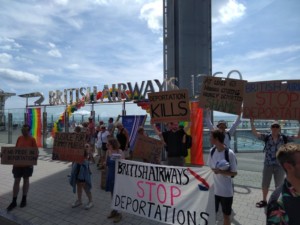
Names, numbers
First a quick snapshot of deportation numbers, types and destinations. We also need to clear up some terminology.
We will use the term “deportations” to refer to all cases where the Home Office moves someone out of the country under direct force (for scheduled flights, this usually means handcuffed to a security “escort”). In the Home Office’s own jargon, these are called “enforced returns”, and the word “deportation” is reserved for people ejected on “public policy” rather than “immigration” grounds – mostly Foreign National Offenders who have been convicted by criminal courts. The Home Office refers to deportations carried out under immigration law euphemistically, calling them “removals” or “returns”.i
As well as “enforced returns”, there are also so-called “voluntary returns”. This means that there is no direct use of force – no guard, no leg or arm restraints. But the term “voluntary” is stretched. Many of these take place under threat of force: e.g., people are pressured to sign “voluntary return” agreements to avoid being forcibly deported, or as the only chance of being released from detention. In other cases, people may agree to “voluntary return” as the only escape route from a limbo of reporting controls, lack of rights to work or rent legally, or destitution threatened by “no recourse to public funds”.
- In 2019, the Home Office reported a total of 18,782 returns: 7,361 “enforced” and 11,421 “voluntary”.ii
- These figures include 5,110 “Foreign National Offenders” (27%). (The Home Office says the majority of these were enforced returns, although no precise figure is provided.)
- There is a notable trend of declining removals, both enforced and “voluntary”. For example, in 2015 there were 41,789 returns altogether, 13,690 enforced and 28,189 “voluntary”. Both enforced and voluntary figures have decreased every year since then.
- Another notable trend concerns the nationalities of deportees. Europeans make up an increasing proportion of enforced deportations. 3,498, or 48%, of all enforced returns in 2019 were EU citizens – and this does not include other heavily targeted non-EU European nationalities such as Albanians. In 2015, there were 3,848 EU enforced returns – a higher absolute figure, but only 28% of a much higher overall total. In contrast, EU nationals still make up a very small percentage of “voluntary” returns – there were only 107 EU “voluntary returns” in 2019.
- The top nationalities for enforced returns in 2019 were: Romania (18%), Albania (12%), Poland (9%), Brazil (8%) and Lithuania (6%). For voluntary returns they were: India (16%), China (9%), Pakistan (9%).
We won’t present any analysis of these figures and trends here. The latest figures show continuing evidence of patterns we looked at in our book The UK Border Regime.iii One key point we made there was that, as the resources and physical force of the detention and deportation system are further diminished, the Border Regime is more than ever just a “spectacle” of immigration enforcement – a pose for media and key voter audiences, rather than a realistic attempt to control migration flows. We also looked at how the scapegoat groups targeted by this spectacle have shifted over recent decades – including, most recently, a new focus on European migration accompanying, or in fact anticipating, the Brexit debate.
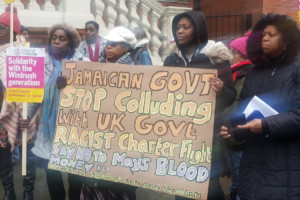
Deportation destinations
Home Office Immigration Statistics also provide more detailed dataiv on the destinations people are “returned” to, which will be important when we come to look at routes and airline involvement. Note that, while there is a big overlap between destinations and nationalities, they are of course not the same thing. For example, many of those deported to France and other western European countries are “third country” removals of refugees under the Dublin agreement – in which governments can deport an asylum seeker where they have already been identified in another EU country.
Here are the top 20 destinations for deportations in 2019 – by which, to repeat, we mean all enforced returns:
| Romania Albania Poland Lithuania Bulgaria France Portugal Germany India Brazil Latvia Pakistan China Netherlands Italy Czech Republic Slovakia Bangladesh Vietnam Hungary | 1208 718 588 386 172 144 132 130 130 128 121 113 109 91 89 87 86 77 63 55 |
It is worth comparing these figures with a similar table of top 20 deportation destinations in the last 10 years – between 2010 and 2019. This comparison shows very strongly the recent shift to targeting Europeans.
| Pakistan India Romania Albania Poland Nigeria Bangladesh China Lithuania Afghanistan Vietnam Italy France Brazil Jamaica Sri Lanka Ghana Ireland Latvia Germany | 10358 9501 8593 7768 6299 5146 4689 4203 3707 3685 3361 3295 2870 2775 2460 1614 1602 1488 1460 1312 |
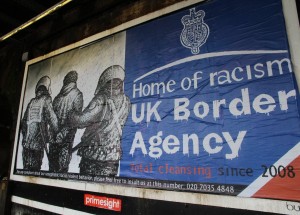
The Home Office: who is targeted and how
As we will see, the actual physical business of deporting people is outsourced to private companies. The state’s role remains giving the orders about who is targeted for arrest and detention, who is then released, and who is forced onto a plane. Here we’ll just take a very quick look at the decision-making structures at work on the government side. This is based on the much more detailed account in The UK Border Regime.
The main state body responsible for immigration control in the UK is the Home Office, the equivalent of other countries’ Interior Ministries. In its current set-up, the Home Office has three divisions: Homeland Security, which runs security and intelligence services; Public Safety, which oversees the police and some other institutions; and Borders, Immigration and Citizenship. The last of these is further divided into three “directorates”: UK Visas and Immigration, which determines visa and asylum applications; Border Force, responsible for control at the frontiers; Immigration Enforcement, responsible for control within the national territory – including detention and deportations. Immigration Enforcement itself has an array of further departments and units. Regular restructuring and reshuffling of all these structures is known to bewilder immigration officers themselves, contributing to the Home Office’s notoriously low morale.v
At the top of the tree is the Home Secretary (interior minister), supported by a more junior Immigration Minister. Along with the most senior civil servants and advisors, these ministers will be directly involved in setting top-level policies on deportations.
For example, an enquiry led by then prisons and probation ombudsman Stephen Shaw into the Yarl’s Wood detention centre revolt in 2002 has given us some valuable insight into the development of modern Home Office deportation policy under the last Labour government. Then Home Secretary Jack Straw, working with civil servants including the Home Office permanent secretary Sir David Omand, introduced the first deportation targets we are aware of, in 2000. They agreed a plan to deport 12,000 people in 2000-1, rising to 30,000 people the next year, and eventually reaching 57,000 in 2003-4.vi
Nearly two decades later, Home Secretary Amber Rudd was pushed to resign after a leak confirmed that the Home Office continued to operate a deportation targets policy, something of which she had denied knowledge.vii The 2017-18 target, revealed in a leaked letter to Rudd from Immigration Enforcement’s director general Hugh Ind, was for 12,800 enforced returns.viii
As the figures discussed above show, recent austerity era Conservative governments are more modest than the last Labour government in their overall deportation targets, and have moved to target different groups. Jack Straw’s deportation programme was almost entirely focused on asylum seekers whose claims had been refused. This policy derived from what the Blair government saw as an urgent need to respond to media campaigns demonising asylum seekers. Twenty years on, asylum seekers now make up a minority of deportees, and have been overtaken by new media bogeymen including European migrants.
In addition, recent Home Office policy has put more effort into promoting “voluntary” returns – largely for cost reasons, as security guards and detention are expensive. This was the official rationale behind Theresa May’s infamous “racist van” initiative, where advertising vans drove round migrant neighbourhoods parading “Go Home” slogans and a voluntary return hotline number.
How do Home Office political targets translate into operations on the ground? We don’t know all the links, but can trace some main mechanisms. Enforced returns begin with arrests. One of the easiest ways to find potential deportees is to grab people as they walk in to sign at an Immigration Reporting Centre. 80,000 migrants in the UK are “subject to reporting requirements”, and all Reporting Centres include short-term holding cells.ix Other deportees are picked up during immigration raids – such as daytime and evening raids on workplaces, or dawn raids to catch “immigration offenders” in their beds.x
Both reporting centre caseworkers and Immigration Compliance and Enforcement (ICE) raid squads are issued with targets and incentives to gather deportees. An Independent Chief Inspector of Borders and Immigration (ICIBI) report from 2017 explains how reporting centre staff work specifically to deportation targets. The inspector also tells us how:
Staff at the London Reporting Centres worked on the basis that to meet their removal targets they needed to detain twice the number of individuals, as around half of those detained would later raise a barrier to removal and be released from detention.
ICE raid teams are set monthly priorities by national and regional commanders, which may include targeting specific nationalities for deportation. For example, the Home Office has repeatedly denied that it sets nationality targets in order to fill up charter flights to particular destinations – but this practice was explicitly confirmed by an internal document from 2014 (an audit report from the director of Harmondsworth detention centre) obtained by Corporate Watch following a Freedom of Information legal battle.xi
Day-to-day deportation and detention decisions are overseen by a central unit called the National Removals Command (NRC). For example, after ICE raid officers make arrests they must call NRC to authorise individuals’ detention. This decision is made on the basis of any specific current targets, and otherwise on general “removability”.
“Removability” means the chance of successfully getting their “subject” onto a plane without being blocked by lack of travel documents, legal challenges and appeals, or other obstacles. For example, nationals of countries with whom the UK has a formal deportation agreement are, all other things being equal, highly removable. This includes the countries with which the UK has set up regular charter flight routes – including Albania, Pakistan, Nigeria and Ghana, and more recently Jamaica and a number of EU countries. On the other extreme, some nationalities such as Iranians present a problem as their governments refuse to accept deportees.
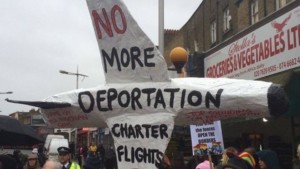
The Home Office: “arranging removal” procedure
A Home Office document called “Arranging Removal” sets out the steps Immigration Enforcement caseworkers need to take to steer their “subject” from arrest to flight.xii
On the one hand, they are under pressure from penny-pinching bosses keen to get the job done as quick and cheap as possible. On the other, they have to be careful not to make any mistakes deportees’ lawyers could use to get flights cancelled. Immigration Officers have the legal power to order deportations without the need for any court decision – however, many deportations are blocked on appeal to courts.
Here are some of the main steps involved:
- Removability assessment. The caseworker needs to assess that: there are no “casework barriers” – e.g., an ongoing asylum claim or appeal that would lead to the deportation being stopped by a court; the detainee is medically “fit to fly”; any family separation is authorised correctly; the detainee has a valid travel document.
- Travel Document. If there is no valid travel document, the caseworker can try to obtain an “emergency travel document” through various routes.
- Executive approval. If all these criteria are met, the caseworker gets authorisation from a senior office to issue Removal Directions (RD) paperwork.
- Risk Assessment. Once the deportation is agreed, the caseworker needs to assess risks that might present themselves on the day of the flight – such as medical conditions, the likelihood of detainee resistance and of public protest. At this point escorts and/or medics are requested. A version of this risk assessment is sent to the airline – but without case details or medical history.xiii
- Flight booking. The caseworker must first contact the Airline Ticketing Team who grant access to an online portal called the Electronic Removal Form (ERF). This portal is run by the Home Office’s flight booking contractor Carlson Wagonlit (see below). Tickets are booked for escorts and any medics as well as the deportee. There are different options including “lowest cost” non-refundable fares, or “fully refundable” – the caseworker here should assess how likely the deportation is to be cancelled. One of the options allows the caseworker to choose a specific airline.
- Notice of removal. Finally, the deportee must be served with a Removal Directions (RD) document that includes notification of the deportation destination and date. This usually also includes the flight number. The deportee must be given sufficient notice: for people already in detention this is standardly 72 hours, including two working days, although longer periods apply in some situations.
In 2015 the Home Office brought in a new policy of issuing only “removal window” notification in many cases – this didn’t specify the date but only a wide timeframe. The window policy was successfully challenged in the courts in March 2019 and is currently suspended.
NB: for much more information on notice periods and other removal issues see the Right to Remain toolkit.

A CWT manager during a protest at one of the travel agent’s UK offices in 2010 (See: https://www.indymedia.org.uk/en/2010/06/452802.html)
Carlson Wagonlit
The electronic booking system is run by a private company, Carlson Wagonlit Travel (CWT). CWT is also in charge of contracting charter flights.
Carlson Wagonlit has been the Home Office’s deportation travel agent since 2004, with the contract renewed twice since then. Its current seven year contract, worth £5.7 million, began in November 2017 and will last until October 2024 (assuming the two year extension period is taken up after an initial five years). The Home Office estimated in the contract announcement that it will spend £200 million on deportation tickets and charters over that seven year period.xiv
Carlson is a global business travel services company, i.e., a large scale travel agent and booker for companies and government agencies. Its official head office is in France, but it is 100% owned by US conglomerate Carlson Companies Inc. It claims to be active in more than 150 countries.
A report on “outsourced contracts” by the Independent Chief Inspector of Borders and Immigration gives us some information on CWT’s previous (2010-17) contract.xv This is unlikely to be substantially changed in the new version, although deportation numbers have reduced since then. The contract involved:
management of charter flights and ticketing provision for scheduled flights for migrants subject to enforced removal and escorts, where required, and the management of relationships with carriers to maintain and expand available routes. […] Annually, CWT processed approximately 21,000 booking requests from Home Office caseworkers for tickets for enforced removals. Some booking requests were for multiple travellers and/or more than one flight and might involve several transactions. CWT also managed flight rescheduling, cancellations and refunds. The volume of transactions processed varied from 5,000 to 8,000 per month.
The inspection report notes the value of CWT’s service to the Home Office through using its worldwide contacts to facilitate deportations:
Both Home Office and CWT managers noted that CWT’s position as a major travel operator had enabled it to negotiate favourable deals with airlines and, over the life of the contract to increase the range of routes available for enforced removals. (Para 5.10).
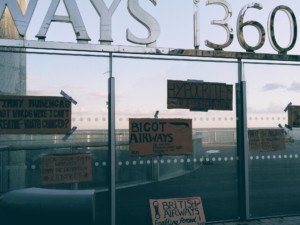
The airlines: regular deportation collaborators
We saw above that Home Office caseworkers book flight tickets through an online portal set up and managed by Carlson Wagonlit Travel. We also saw how CWT is praised by Home Office managers for its strong relationships with airlines, and ability to negotiate favourable deals.
For charter flight deportations, we know that CWT has developed a particular relationship with one charter company called Titan Airways. We have looked at Titan in our previous reports on charter flight deportations.
Does the Home Office also have specific preferred airline partners for scheduled flights? Unfortunately, this isn’t an easy question to answer. Under government procurement rules, the Home Office is required to provide information on contracts it signs – thus, for example, we have at least a redacted version of the contract with CWT. But as all its airline bookings go through the intermediary of CWT, there are no such contracts available. Claiming “commercial confidentiality”, the Home Office has repeatedly information requests on its airline deals. (We will look in a bit more depth at this issue in the annex.)
As a result, we have no centrally-gathered aggregate data on airline involvement. Our information comes from individual witnesses: deportees themselves; their lawyers and supporters; fellow passengers, and plane crew. Lawyers and support groups involved in deportation casework are a particularly helpful reference, as they may know about multiple deportation cases.
For this report, we spoke to more than a dozen immigration lawyers and caseworkers to ask which airlines their clients had been booked on. We also spoke to anti-deportation campaign groups including Lesbians and Gays Support the Migrants, who have run recent campaigns calling on airlines to refuse to fly deportees; and to the trade union Unite, who represent flight crew workers. We also looked at media reports of deportation flights that identify airlines.
These sources name a large number of airlines, and some names come up repeatedly. British Airways is top of the list. We list a few more prominent collaborators below: Easyjet, Kenya Airways, Ethiopian Airlines, Qatar Airways, Turkish Airlines, Royal Jordanian. Virgin Airlines is the only company to have publicly announced it has stopped carrying deportees from the UK – although there have been some questions over whether it is keeping this promise.
However, the information we have does not allow us to determine the exact nature of the relationship with these airlines. How many airlines appear in the CWT booking system – what determines which ones are included? Does CWT have a preferential arrangement with BA or other frequent deportation airlines? Does the Home Office itself have any direct interaction with these airlines’ management? How many airlines are not included in the CWT booking system because they have refused to carry deportees?
For now, we have to leave these as open questions.
British Airways
We have numerous reports of British Airways flying deportees to destinations worldwide – including African and Caribbean destinations, amongst others. Cabin crew representatives in Unite the Union identify British Airways as the main airline they say is involved in deportation flights.
The airline has long been a key Home Office collaborator. Back in 2003, at the height of the Labour government’s push to escalate deportations, the “escort” security contractor was a company called Loss Prevention International. In evidence to a report by the House of Commons home affairs committee, its chief executive Tom Davies complained that many airlines at this point were refusing to fly deportees. But he singled out BA as the notable exception, saying: “if it were not for […] the support we get from British Airways, the number of scheduled flight removals that we would achieve out of this country would be virtually nil”.xvi
In 2010, British Airways’ role was highlighted when Jimmy Mubenga was killed by G4S “escorts” on BA flight 77 from Heathrow to Angola.
Since 2018, there has been an active calling on BA to stop its collaboration. The profile of this issue was raised after BA sponsored Brighton Pride in May 2018 – whilst being involved in deportations of lesbian and gay migrants to African countries where their lives were in danger. After winning a promise from Virgin Airways to cease involvement in deportations (see below), the group Lesbians and Gays Support the Migrants (LGSM) have made BA the main target for their anti-deportation campaigning.
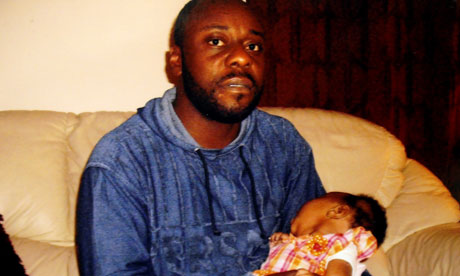
Jimmy Mubenga, killed on a BA flight in 2010
The campaign has also now been supported by BA cabin crew organised in the union Unite. In December 2019 Unite cabin crew branches passed a motion against airline scheduled flight deportations.xvii
Kenya Airways
We have numerous reports from caseworkers and campaigners of Kenya Airways flying deportees to destinations in Africa.
The typical route is a flight from Heathrow to Nairobi, followed by a second onward flight. People deported using this route have included refugees from Sudan and Somalia.
Easyjet
We have numerous reports of Easyjet flying deportees to European destinations. Easyjet appears to be a favoured airline for deportations to Eastern European countries, and also for “third country” returns to countries including Italy and Germany. While most UK scheduled deportations are carried out from Heathrow and Gatwick, we have also seen accounts of Easyjet deportations from Luton.
Qatar Airways
We have numerous reports of Qatar Airways carrying deportees to destinations in the Middle East, Asia and Africa. Qatar Airways has carried deportees to Iraq, according to the International Federation of Iraqi Refugees (IFIR), and also to Sudan. (In March 2019 the airline suspended its Sudan route, but this appears to have been restarted – the company website currently advertises flights to Khartoum in April 2020.xviii) Other destinations include Pakistan, Bangladesh, China, Thailand, the Philippines, and Uganda. The typical route is from Heathrow via Doha.
Turkish Airlines
We have numerous reports of Turkish Airlines carrying deportees. The typical route is Heathrow or Gatwick to Istanbul, then an onward flight to further destinations including Iraq and Afghanistan. According to the International Federation of Iraqi Refugees (IFIR), Turkish Airlines has been one of the main companies involved in deportations to Iraq. A media report from June 2019 also mentions Turkish Airlines carrying someone being deported to Somalia via Istanbul.xix In August 2017, a Turkish Airlines pilot notably refused to fly an Afghani refugee from Heathrow to Istanbul, en route to Kabul, after being approached by campaigners – but this does not reflect general company policy.xx
Ethiopian Airlines
We have reports of this airline deporting people to Ethiopia and other African countries, including Sudan. Flights are from Heathrow to Addis Ababa. In April 2018, high-profile Yarl’s Wood hunger striker Opelo Kgari was booked on an Ethiopian flight to Addis Ababa en route to Botswana.
Air France
Air France are well-known for carrying deportees from France, and have been a major target for campaigning by anti-deportation activists there. We also have several reports of them carrying deportees from the UK, on flights from Heathrow via Paris.
Royal Jordanian
According to IFIR, Royal Jordanian has been involved in deportations to Iraq.
Virgin Airlines
In June 2018, Virgin announced that it had ceased taking bookings for deportation flights. Virgin had previously been a regular carrier for deportations to Jamaica and to Nigeria. (NB: Nigeria is often used as a deportation transit hub from where people are subsequently removed to other African countries.) The announcement came after the Windrush scandal led to the Home Office apparently suspending deportations to the Caribbean, and following campaigning by Lesbians and Gays Support the Migrants (LGSM) – although Virgin claimed it had made the decision before being contacted by the campaign. A Virgin statement said:
we made the decision to end all involuntary deportations on our network, and have already informed the Home Office. We believe this decision is in the best interest of our customers and people, and is in keeping with our values as a company.xxi
But there are doubts over just how much Virgin’s promise is worth. According to a report by The Independent:
The airline had agreed to deport a man to Nigeria […] a day after announcing the decision. The only reason he wasn’t removed was because the Home Office agreed to consider new representations following legal intervention.xxii

Do airlines have a choice?
In response to its critics, British Airways has consistently given the same reply: it has no choice but to cooperate with the Home Office. According to an August 2018 article in The Guardian, BA says that it has “a legal duty under the Immigration Act 1971 to remove individuals when asked to do so by the Home Office.” A company spokesperson is quoted saying:
Not fulfilling this obligation amounts to breaking the law. We are not given any personal information about the individual being deported, including their sexuality or why they are being deported. The process we follow is a full risk assessment with the Home Office, which considers the safety of the individual, our customers and crew on the flight.xxiii
The last parts of this answer fit the process we looked at above. When booking the flight, the Home Office caseworker sends the airline a form called an Airline Risk Report (ARA) which alerts it to risk issues, and specifies why escorts or medics are needed – including an assessment of the likelihood of resistance. But no information should be shared on the deportee’s medical issues or immigration case and reasons for deportation.
But is it true that an airline would be breaking the law if it refused a booking? Lesbians and Gays Support the Migrants have shared with us a legal opinion they received from law firm Duncan Lewis on this issue. We summarise the main points here.
The law in question is the Immigration Act 1971, Section 27(1)(b)(iii). This states that, when issued the correct legal order by the Home Office, the “owner or agent of a ship or aircraft” must “make arrangements for or in connection with the removal of a person from the United Kingdom when required to do so [by appropriate Removal Directions]”. It is an offence to fail to do so “without reasonable excuse”.
The offence is punishable by a fine, and potentially a prison sentence of up to six months. As a minor “summary only” offence, any case would be heard by a magistrates’ court rather than a jury.
In fact many airline captains have refused to carry deportees – as we will see in the next section. But there are no recorded cases of anyone ever being prosecuted for refusing. As with many areas of UK immigration law, there is simply no “case law” on this question.
If a case ever does come to court, it might turn on that clause about a “reasonable excuse”. The legal opinion explains that the airline might argue they refused to carry a deportee because doing so would present a risk to the aircraft or passengers, for example if there is resistance or protest. A court might well conclude this was “reasonable”.
On the other hand, the “reasonable excuse” defence could be harder to apply for an airline that took a principled stand to refuse all deportations as a general rule, whether or not there is disruption.
Again, though, all this is hypothetical as the Home Office has never actually prosecuted anyone. Virgin Airlines, the first company to have publicly stated that it will not fly deportees from the UK, so far has not faced any legal comeback. As reported in the press, a Virgin spokesperson explained the company’s position like this:
We’ve made the decision to end all involuntary deportations on our network, and have informed the Home Office. We always comply with the law and would continue to comply with legislation; however, we have ended our contractual agreement to carry involuntary deportees.xxiv
Due to our lack of information on Home Office agreements with airlines, it’s hard to assess exactly what this means. Possibly, Virgin previously had an outstanding deal with the Home Office and Carlson Wagonlit where their tickets came up on the CWT booking portal and were available for caseworkers, and this has now ended. If the Home Office insisted on contacting them and booking a ticket regardless, they might then be pushed to “comply with the law”.
Above we saw that, according to evidence referred to in a report of the House of Commons home affairs select committee, in 2003 the majority of airlines actually refused to carry deportees, leaving the Home Office to depend almost exclusively on British Airways. Even in this context there were no prosecutions of airlines.
This is not an uncommon situation across UK immigration law: much of it has never come to court. For example, as we have discussed in reports on immigration raids, there have been no legal cases testing many of the powers of ICE raid squads. To give another example, on numerous occasions campaigners have obstructed buses taking detainees to charter flights without any prosecution – the Stansted 15 trial of protestors blocking a plane inside the airport was the first high-profile legal case following an anti-deportation action.
Even if the government has a legal case for prosecuting airlines, this could be a highly controversial move politically. The Home Office generally prefers not to expose the violence of its immigration enforcement activities to the challenge of a public legal hearing.
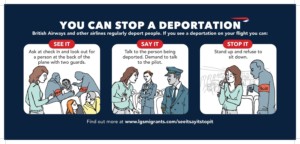
Resistance
We want to conclude this report on an upbeat note. Deportations, and scheduled airline flights in particular, are a major site of struggle. Resistance is not just possible but widespread and often victorious. Thousands of people have managed to successfully stop their “removals” through various means, including the following:
- Legal challenges: a large number of flights are stopped because of court appeals and injunctions.
- Public campaigning: there is a strong tradition of anti-deportation campaigning in the UK, usually supporting individuals with media-focused and political activity. Common tactics include: media articles highlighting the individual’s case; enlisting MPs and appealing to ministers; petitions, letters of support; mass phone calls, emails, etc., to airlines; demos or leafletting at the airport targeting air crew and passengers.
- Solidarity action by passengers: in some high-profile cases, passengers have refused to take their seats until deportees are removed. This creates a safety situation for the airline which may often lead to the pilot ordering escorts to remove their prisoner.
- Direct action by detainees: many detainees have been able to get off flights by putting up a struggle. This may involve, for example: physically resisting escorts; taking off clothes; shouting and appealing to passengers and air crew for help. Unless the deportee is extremely strong physically, the balance of force is with the escorts – and sometimes this can be lethal, as in the case of Jimmy Mubenga. However, pilots may often order deportees off their plane in the case of disruption.
There are many reports of successful resistance using one or more of these tactics. And we can also get some glimpses of their overall power from a few pieces of aggregate information.
In a 2016 report, the Independent Chief Inspector of Borders and Immigration revealed one telling figure. Looking at the figures for six months over 2014-15, he found that “on average 2.5 tickets were issued for each individual successfully removed.”xxv Some of this can be put down to the notorious inefficiency of Home Office systems: the Inspection report looks at several kinds of coordination failures between Home Office caseworkers, the escort contractor (at that point a subsidiary of Capita), and Carlson Wagonlit.
But this is not the biggest factor. In fact, the same report breaks down the reasons for cancellation for a sample of 136 tickets. 51% of the sampled cancellations were the result of legal challenges. 18% were because of “disruptive or non-compliant behaviour”. 2% (i.e., three cases) were ascribed to “airline refusal to carry”.
Where there is resistance, there is also reaction. As we have discussed in previous reports, one of the main reasons prompting the development of charter flights was to counter resistance by isolating deportees from passengers and supporters. This was very clearly put in 2009 by David Wood, then strategic director of the UK Border Agency (Home Office), who explained that the charter flight programme is:
“a response to the fact that some of those being deported realised that if they made a big enough fuss at the airport – if they took off their clothes, for instance, or started biting and spitting – they could delay the process. We found that pilots would then refuse to take the person on the grounds that other passengers would object.”xxvi
For both deportees and supporters, charter flights are much harder to resist. But they are also very expensive; require specific diplomatic agreements with destination countries; and in some cases (Iraq, Afghanistan and Sri Lanka) have been blocked by legal and political means.xxvii The Home Office cannot avoid the use of scheduled flights for the majority of deportations, and it will continue to face resistance.
Annex: issues with accessing airline information
We will expand a bit here on the issues around obtaining information on the Home Office’s relationships with airlines.
Under UK and EU public sector procurement rules, central government departments are obliged to publish announcements of all contracts valued over £10,000, including on the contractsfinder website. However, there is no publicly available information on any contracts between the Home Office and specific airlines. This is legally justifiable if the Home Office has no direct contractual agreements with airlines. It has a signed contract with Carlson Wagonlit Travel (CWT), which is published in a redacted form; and CWT then makes arrangements with airlines on a per-ticket basis.
The Home Office certainly has knowledge of all the tickets booked on its behalf by CWT – indeed, they are booked by its own employees through the CWT maintained portal. And so it certainly knows all the airlines working for it. But it has refused all requests for this information, using the excuse of “commercial confidentiality”.
There have been numerous attempts to request information on deportation airlines using the Freedom of Information Act.xxviii All have been refused on similar grounds. To give one standard example, in December 2018 A. Liberadzki requested statistics for numbers of removals carried out by British Airways and other scheduled airlines. The response confirmed “that the Home Office holds the information that you have requested.” However, it argued that:
“we have decided that the information is exempt from disclosure under sections 31(1)e and 43(2) of the FOIA. These provide that information can be withheld if its disclosure would have a detrimental effect on the Home Office and its ability to operate effective immigration controls by carrying out removals or would, or would be likely to, prejudice the commercial interests of any persons (including the public authority holding it).”
In April 2019 Kate Osamor MP put similar questions to the Home Secretary in parliament.xxix She received the same reply to all her questions:
“The Home Office does not disclose the details or values of its commercial contracts. Doing so could discourage companies from dealing with the Home Office.”
Of course this answer is blatantly false – as we just saw, the Home Office is legally obliged to disclose values of commercial contracts over £10,000.
Footnotes
iBoth types, “public policy” and “immigration”, are included in the main statistics published on “enforced returns” – there is no separate breakdown of “deportations” in the Home Office sense.
iiHome Office quarterly Immigration Data summary tables – detentions and returns, Q4 2019: https://www.gov.uk/government/publications/immigration-statistics-year-ending-december-2019/how-many-people-are-detained-or-returned NB: as the Home Office stresses, the voluntary returns statistic is liable to under-counting as officials do not monitor people leaving voluntarily in real time but rely on later information, e.g., to confirm whether people took a flight.
iiiCorporate Watch: The UK Border Regime. Corporate Watch, 2018. Available to download here: https://corporatewatch.org/product/the-uk-border-regime/
ivHome Office quarterly Immigration Data datasets on detention and returns: https://www.gov.uk/government/statistical-data-sets/returns-and-detention-datasets
NB: there appear to be some discrepancies in the Home Office data releases: the total figure for enforced returns we get from adding up country totals in the destinations dataset is around 5% below that reported in the headline summary tables. But the numbers seem reliable enough to give us an indication of the main destinations and trends.
vThe pace of restructuring also means that our information on Home Office structures may go out of date quickly. As yet there has been no big reshuffle since we wrote The UK Border Regime – but it wouldn’t be surprising if some new rebranding takes place soon as part of Brexit moves.
viSee: The UK Border Regime Chapter 1
viihttps://www.theguardian.com/politics/2018/apr/29/amber-rudd-resigns-as-home-secretary-after-windrush-scandal
viiihttps://www.theguardian.com/politics/2018/apr/27/amber-rudd-was-told-about-migrant-removal-targets-leak-reveals
ixSee The UK Border Regime Chapter 5 on the Reporting system
xSee The UK Border Regime Chapter 6 on raids
xiSee The UK Border Regime p116
xii“Arranging Removal” Version 2.0 was published in October 2018 and is still listed on the Home Office website’s “Returns Preparation” guidance page as of April 2020: https://www.gov.uk/government/publications/returns-preparation
xiiiHere it’s worth reproducing the standard paragraphs sent to airlines in the ARA form when escorts are ordered. If there is no disruption expected: “Due to the nature of the returnee’s medical condition / conviction, escorts have been arranged to provide assistance during this removal but no adverse disruption is expected.’ If disruption is expected: “Escorts have been assigned to this removal in order to mitigate against any disruption that may be attempted by the returnee in order to frustrate removal.” See: Home Office staff guidance “Arranging Removal” Version 2.0, October 2018. Page 15. https://www.gov.uk/government/publications/returns-preparation
xivHome Office contract announcement posted on Contractsfinder website: https://www.contractsfinder.service.gov.uk/Notice/36f67d6d-2b26-4ecb-88c6-41291aa8af37
xvhttps://assets.publishing.service.gov.uk/government/uploads/system/uploads/attachment_data/file/549239/ICIBI-report-on-Outsourced-Contracts-and-Cedars_March_2016.pdf
xvihttps://publications.parliament.uk/pa/cm200203/cmselect/cmhaff/654/65407.htm
xviihttps://www.huffingtonpost.co.uk/entry/british-airways-unite-forced-deportations_uk_5de7bc66e4b0d50f32ac1528
xviiihttps://english.alaraby.co.uk/english/news/2019/3/18/qatar-airways-suspends-flights-to-sudan-amid-soaring-inflation
xxhttps://www.independent.co.uk/news/uk/home-news/samim-bigzad-deport-uk-afghan-asylum-seeker-taliban-death-threats-government-pilot-refuse-take-off-a7918706.html
xxihttps://www.theguardian.com/uk-news/2018/jun/29/virgin-airlines-no-longer-help-deport-immigrants-lgbt-windrush
xxiihttps://www.independent.co.uk/news/uk/home-news/virgin-atlantic-deportations-home-office-airline-flight-nigeria-deport-airline-a8426691.html
xxiiihttps://www.theguardian.com/world/2018/aug/02/british-airways-criticised-by-lgbt-groups-over-asylum-removals
xxvICIBI: “An Inspection of Home Office Outsourced Contracts for Escorted and Non-Escorted Removals and Cedars Pre-Departure Accommodation”, March 2016 https://assets.publishing.service.gov.uk/government/uploads/system/uploads/attachment_data/file/549239/ICIBI-report-on-Outsourced-Contracts-and-Cedars_March_2016.pdf
xxvihttps://www.telegraph.co.uk/news/uknews/5374109/Asylum-airlines-your-one-way-flight-to-deportation.html
xxvii See The UK Border Regime, Chapter 8 for discussion of all these points
xxviiiSome of these FOIA requests, and the HO’s responses, have been published on the “What Do They Know?” Website. We have also seen other unpublished correspondence, which has very similar results. https://www.whatdotheyknow.com/request/537701/response/1290493/attach/3/FOI%2051456%20Liberadski.pdf
https://www.whatdotheyknow.com/request/statistics_on_involuntary_remova
https://www.whatdotheyknow.com/request/statistics_for_seats_purchased_b#incoming-1233696
